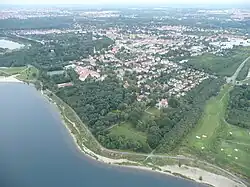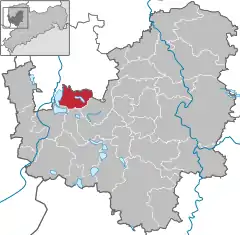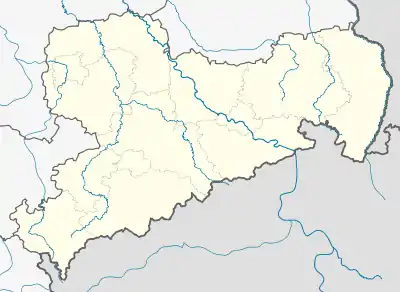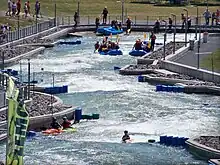Markkleeberg
Markkleeberg is an affluent[3][4] suburb of Leipzig, located in the Leipzig district of the Free State of Saxony, Germany. The river Pleiße runs through the city, which borders Leipzig to the north and to the west.
Markkleeberg | |
|---|---|
 | |
 Coat of arms | |
Location of Markkleeberg within Leipzig district  | |
 Markkleeberg  Markkleeberg | |
| Coordinates: 51°16′40″N 12°23′00″E | |
| Country | Germany |
| State | Saxony |
| District | Leipzig |
| Subdivisions | 9 |
| Government | |
| • Mayor (2020–27) | Karsten Schütze[1] (SPD) |
| Area | |
| • Total | 31.36 km2 (12.11 sq mi) |
| Elevation | 132 m (433 ft) |
| Population (2021-12-31)[2] | |
| • Total | 24,643 |
| • Density | 790/km2 (2,000/sq mi) |
| Time zone | UTC+01:00 (CET) |
| • Summer (DST) | UTC+02:00 (CEST) |
| Postal codes | 04416 |
| Dialling codes | 0341, 034297, 034299 |
| Vehicle registration | L, BNA, GHA, GRM, MTL, WUR |
| Website | www.markkleeberg.de |
Markkleeberg is known to be the entry point[5] to a region of recultivated open-cast mining lakes south of Leipzig dubbed the Leipziger Neuseenland.
History
The town now called Markkleeberg has its origins in several towns that have been merged over the years. The center of modern-day Markkleeberg used to be called Oetzsch. It was merged with the smaller outlying district Markkleeberg in 1911 and renamed Oetzsch-Markkleeberg. Oetzsch-Markkleeberg was in turn merged with Gautzsch and the whole town was called "Markkleeberg", although Markkleeberg was the smallest, because it sounded most Germanic at a time of Nazi-led Germanisation.
The etymology of Markkleeberg may be "clover hill market town". The name of Oetzsch has most likely a Wendish origin. In 1316 it was mentioned in a document as "Euschiz". The village originally had the form of a Rundling.
In 1813 much of the Battle of Leipzig took place where today's Markkleeberg is situated. During 1944 and 1945, a forced labor camp for women was established in the town, initially a subcamp of the Ravensbrück concentration camp and later of Buchenwald.[6] Among the inmates were a thousand Jewish women from Hungary and 250 French resistance fighters.[7] In early April 1945, the surviving inmates were transferred to the Mauthausen-Gusen camp in Austria.
Today, Markkleeberg is a growing town because of its proximity to Leipzig.[8]
Historical population
(Source since 1998: Statistical bureau of Saxony)
|
|
|
|
Culture
Markkleeberg is a well-known tourist destination. Cospudener See, Markkleeberger See, Kanupark Markkleeberg as well as many parks are close to the city.
 Markkleeberg town hall
Markkleeberg town hall Markkleeberg castle
Markkleeberg castle Musentempel, monopteros in the Agra park
Musentempel, monopteros in the Agra park Ruined church in Wachau
Ruined church in Wachau Gründerzeit house in Markkleeberg
Gründerzeit house in Markkleeberg
 Keesscher park and Martin Luther church
Keesscher park and Martin Luther church
Twin towns – sister cities
Markkleeberg is twinned with:[9]
 Boville Ernica, Italy
Boville Ernica, Italy Neusäß, Germany
Neusäß, Germany Pierre-Bénite, France
Pierre-Bénite, France Zărnești, Romania
Zărnești, Romania
References
- Wahlergebnisse 2020, Freistaat Sachsen, accessed 10 July 2021.
- "Bevölkerung des Freistaates Sachsen nach Gemeinden am 31. Dezember 2021" (XLS) (in German). Statistisches Landesamt des Freistaates Sachsen. 2022.
- ""Schere zwischen Arm und Reich nirgendwo so extrem"". LVZ - Leipziger Volkszeitung (in German). Retrieved 2021-04-12.
- "7,3 Millionen Euro!: Markkleebergs teuerste Villa zu verkaufen". bild.de (in German). Retrieved 2021-04-12.
- "Tourist-Information Leipziger Neuseenland und Stadt Markkleeberg". MKB (in German). Retrieved 2021-04-12.
- Stessel, Zahava. "Memorial tablet for victims of the Women's Camp of Buchenwald" (in German). Retrieved 23 August 2018.
- "Homage to Frau Dr. Zahava Stessel, nee Katalin Szasz, survivor of the camp". www.markkleeberg.de/de/startseite/ Mark*Klee*Berg in Sachsen (in German). Retrieved 23 August 2018.
- "Life and Living in Markkleeberg". www.eigentumswohnung-kaufen-leipzig.de (in German). Retrieved 2017-11-23.
- "Partnerstädte" (in German). Markkleeberg. Retrieved 2021-12-09.